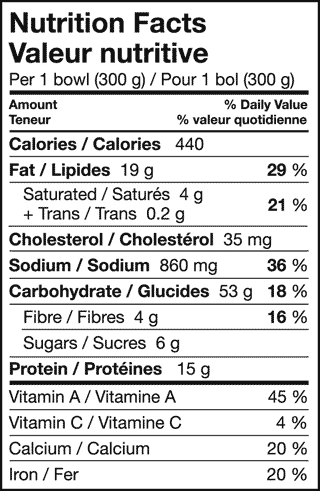Registered Dietitian, Melanie Douglass sorts through 12 of the common traps waiting for you in the grocery store.
______________________________________________________________
1. “Natural”
a. If a food has sugar, high-fructose corn syrup, glucose-fructose syrup, OR more than 4 grams of sugar or 3 grams of fat per serving, then “natural” means nothing. Sugar is natural, lard is natural… and they are a far cry from “healthy”.
b. Foods to watch out for: cheese (high in fat), yogurts, beverages, fruits, etc (high in sugar)
2. “Vitamin C-Boost”
a. If a food has more than 500 mg of Vitamin C, then it’s not worth the extra money. Your body can only absorb 500 mg at a time. Plus, if you have to drink/consume 200 – 400 calories just to get that vitamin C boost, then it’s not worth it. Go for a calorie-free Vitamin C supplement instead.
3. “Yogurt-covered”
a. Yogurt coating is full of saturated fat. An ity-bity 2 tbsp. serving of yogurt-covered raisins packs 7 gram of fat and 6 of those are saturated. Ouch. Don’t buy anything yogurt coated.
4. “Dried Fruit”
a. Only buy dried fruit that is soft and made without added sugars. Dried fruit that is rock-hard (like banana chips) is full of saturated fat. In a ¼-cup serving of banana chips, you’ll get 7 grams of fat and 6 of those are saturated. Double ouch.
5. “0 gram Trans Fat”
a. Just because a food has 0 grams trans fat doesn’t mean it’s also low in saturated fat – the other heart-damaging fat. Cookies with 0 grams trans fat are still cookies—packed with sugar, calories and artery clogging saturated fat.
6. “Sparking Water with Natural Flavors”
a. Natural flavors in water-type beverages often means it’s sweetened with Acesulfame K or Aspartame—two non-nutritive sweeteners that are far from natural in my book.
7. “98% Fat-free” meats
a. 98% fat-free hot dogs and bologna are often made with “mechanically separated” meats. I’m not a fan of mechanically separated meat because it can contains bits and pieces of spinal cord. Here’s a good explanation:
i. “Mechanically separated meat is a paste produced by compressing carcasses, much like a used car is crushed into a dense block of metal” (Nutrition Action Healthletter, June 2001)
8. “2% Reduced Fat” flavored milks
a. Just because it’s reduced fat doesn’t mean it’s healthy. Flavored milks are really high in sugar. 10 teaspoons per convenience-store bottle! (That’s as much added sugar as you should have in an entire day.)
9. “No Cholesterol”
a. Margarine never had cholesterol in the first place. Just because a margarine or butter spread says “no cholesterol” doesn’t mean it’s healthy. Look for spreads higher in monounsaturated fats and lower in saturated and trans fat.
10. “with Vitamins & Minerals!”
a. Snacks like Poptarts, that have “7 vitamins and minerals!” often only provide 10% or so of mostly b-vitamins that most people aren’t deficient in anyway. It’s not much of a help—and certainly not a good reason to eat more sugar or fat.
11. “Full Serving Vegetables!”
a. If you have to drink a beverage laden with extra sugar and 1/3 of your day’s sodium (480 mg) just to get a “full serving of vegetables”, then that is not a good trade. Regular vegetables have 20 – 60 calories and no added sugar or sodium… unlike most beverages.
12. “Made with Whole Grain”
a. A food needs to have at least 16 grams of “whole grain” on the label in order to make a dent in your whole-grain intake and improve your health. Don’t confuse “whole grains” and fiber. 8 grams of whole grain usually only has 1 gram of fiber. Foods like snack crackers and cereals usually have 5 – 10 grams of whole grain per serving. Whoopee. I prefer to shop for foods by fiber content and not the elusive and tricky “whole grains”. Look for foods with 3 – 5 grams of fiber per serving.
___________________________________________________________________
Have a health question for Melanie? Click here to submit your question http://www.tipadayguide.com/blog and Melanie will answer your question on an upcoming Studio 5 segment!
HEALTHY LIVING TIP OF THE DAY
By Melanie Douglass, R.D., NASM
Author: Tip-a-Day Guide to Healthy Living
(Deseret Book, 2007)
http://www.tipadayguide.com
© 2007 Melanie Douglass, Deseret Book















Add comment